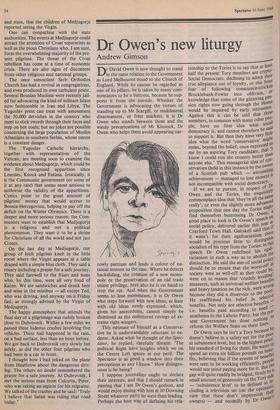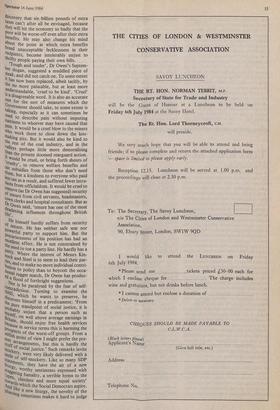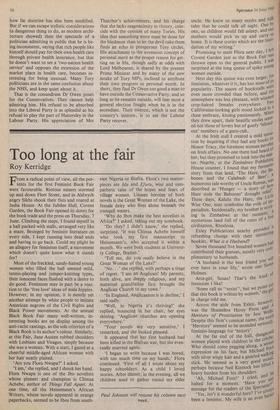Dr Owen's new liturgy
Andrew Gimson
nr David Owen is now thought to stand in the same relation to the Government as Lord Melbourne stood to the Church of England. While he cannot be regarded as one of its pillars, he is taken by many com- mentators to be a buttress, because he sup- ports it from the outside. Whether the Government is advocating the virtues of standing up to Mr Scargill, or multilateral disarmament, or freer markets, it is Dr Owen who stands between them and the windy prevarications of Mr Kinnock, Dr Owen who helps them avoid appearing nar- rowly partisan and lends a colour of na- tional interest to the case. Where he detects backsliding, the creation of a new mono- poly or the preservation of an old trade union privilege, here also he is on hand to stop the rot. And when the Government seems to lose momentum, it is Dr Owen who steps forward with new ideas, at least with old ideas newly expressed, which, given his antecedents, cannot simply be dismissed as the embittered ravings of ex- treme right-wingers.
This estimate of himself as a Conserva- tive he is understandably reluctant to en- dorse. Asked what he thought of the Spec- tator, he replied, carefully distant: 'The political Right have insights which we on the Centre Left ignore at our peril. The Spectator is as good a window into their perceptions as any I know.' How disingen- uous is he being?
I suppose journalists ought to declare their interests, and that I should remark in passing that I am Dr Owen's godson, and would enjoy dining with him at 10 Downing Street whatever party he were than leading. Perhaps the best way of defining his rela- tionship to the Tories is to say that at least half the present Tory members are crypto- Social Democrats, declining to admit their true allegiance out of loyalty, or else from fear of following conscience-stricken Brocklebank-Fowler into oblivion, or knowledge that some of the glittering Pen- sion rights now going through the Haase would be impaired by early retirement. Against this it can be said that these members, in common with many other peo- ple, have no firm idea what social democracy is, and cannot therefore be said to support it. But then they have very little idea what the word 'conservative' might mean, beyond the belief, once expressed to me by an aspiring Tory candidate, that I know I could run the country better than anyone else.' This managerial idea of al' servatism (held in this instance by the owner of a Scottish pub which — astounding achievement — managed to lose money) is not incompatible with social democracy. If we are to pursue, in respect of Dr Owen and the Tories, the exquisitelY commonplace idea that 'they're all the sat°, really', or even the slightly more advanced proposition that one day the Tories might find themselves buttressing Dr Owens a good place to look is Dr Owen's speech on social policy, delivered earlier this Year an Crayford Town Hall. Gaitskell said that II it wasn't for their egalitarianism there would be precious little to distinguish socialists socialists of his type from the Tories: in this speech Dr Owen redefined his egall- tarianism in such a way as to abolish the distinction. He said the aim of social Prillc„Y should be to ensure that the worst-off I" society were as well-off as they could .be: went on to reason that 'crudely levellVs
measures, such as universal welfare ben heavy taxation on the rich, were wrong
because they did a disservice to the Poor He reaffirmed his belief in selective benefits. Not only are selective benefits -- i.e. benefits paid according to need anathema to the Labour Party, but the P'„`', sent Government has done nothing to reform the Welfare State on these lines. Dr Owen says he isn't a Tory because he doesn't believe in a safety net for the 10).r at subsistence level, but in the highest pass'. ble standard of living for them. He wants to spend an extra six billion pounds on bee,rle„- fits, believing that if the system of benellie" were seen to be working efficiently, Pe°Pe would not mind paying more for it. But th''s gap will quite readily be bridged, firstly by e small amount of generosity on the Tory stu — 'subsistence level' to be defined as 1°.c eluding a television set (on the opttaTti;r view that these don't impoverish tae:s owners) — and secondly by Dr Owen
discovery that six billion pounds of extra taxes can't after all be envisaged, because they will hit the economy so badly that the Poor will be worse-off even after their extra benefits. He may also change his mind about the point at which extra benefits breed unacceptable fecklessness in their recipients, become intolerably unjust to thrifty people paying their own bills. `Tough and tender', Dr Owen's Septem-
ber Slogan, suggested a muddled piece of
steak, and did not catch on. To some extent it has now been replaced, albeit tacitly, by the no more palatable, but at least more
understandable, 'cruel to be kind'. 'Cruel'
is a disagreeable word. It is also an accurate one for the sort of measures which the
Government should take, to some extent is
taking, especially as it can sometimes be Used to describe pain without imputing
nastiness to whoever may have caused that
Pain. It would be a cruel blow to the miners
Who work there to close down the loss- making pits. But it would also be kind to the rest of the coal industry, and in the v,ralleys perhaps little more demoralising ;flan the present doomed rearguard action. 't would be cruel, or bring forth shouts of cruelty', to remove welfare benefits and ti ssa_x subsidies from those who don't need tin em, but a kindness to everyone who paid ‘? tax as a result, and suffered fewer intru- sions from officialdom. It would be cruel to remove (as Dr Owen has suggested) security of tenure from civil servants, headmasters, town clerks and hospital consultants. But as Dr Owen said, 'tenure has one of the most deadening influences throughout British ,He himself hardly suffers from security cd tenure. He has neither safe seat nor Powerful party to support him. But the Precariousness of his position has had an excellent effect. He is not constrained by the need to toe a party line. He hardly has a Party. Where the interest of Messrs Kin- riock and Steel is to seem to lead their par- ties, and to make no more individual contri- buti°fl to policy than to boycott the occa- siePrial rugger match, Dr Owen has produc- d a flood of forthright suggestions. _ Nor is he paralysed by the fear of self- cNri)ntradiction. Turning to examine the d:I1S, which he wants to preserve, he triscovers himself in a predicament: 'From pnre Pure standpoint of social justice, it is myself, unjust that a person such as Britain, on well above average earnings in heltain, should enjoy free health services prr,eause in service terms this is harming the sWrsPects of the worst-off groups. From a selfish Point of view I might prefer the pre- s4 arrangements, but this is hardly the tno f of social justice.' Such remarks invite sln.c,kerY, were very likely delivered with a salt'e of self-mockery. Like so many SDP litp,!nlents, they have the air of a new ROY, Worthy sentiments expressed with ‘0„ggering banality, a terrible hymn to the towen, classless and more equal society' AnPd. s which the Social Democrats aspire. ph: like a new liturgy, the novelty of the rsIng sometimes makes it hard to judge
how far doctrine has also been modified. But if we can escape stylistic considerations (a dangerous thing to do, as modern archi- tecture showed) then the spectacle of a politician admitting in public that he is be- ing inconsistent, saying that rich people like himself should pay for their own health care through private health insurance, but that he doesn't want to see a 'two-nation health service' and opposes the extension of the market place in health care, becomes in- teresting for being unusual. Many Tory politicians are in the same confusion about the NHS, and keep quiet about it.
That is the conundrum Dr Owen poses for the Conservatives. They cannot help admiring him. His refusal to be absorbed into the Liberal Party is as splendid as his refusal to play the part of Hattersley in the Labour Party. His appreciation of Mrs Thatcher's achievements, and his charge that she lacks magnanimity in victory, coin- cide with the opinion of many Tories. His idea that something more must be done for the hindmost than to let the devil take them finds an echo in prosperous Tory circles. His attachment to the strenuous concept of personal merit as the proper reason for get- ting on in life, though sadly at odds with Lord Melbourne, is shared by the present Prime Minister and by many of the new intake of Tory MPs, inclined to attribute their own progress to personal worth. In short, they find Dr Owen too good a man to have outside the Conservative Party, and so long as he remains outside, will fear most a general election fought when he is in the ascendant. Their interest, which is not the country's interest, is to see the Labour Party recover.














































 Previous page
Previous page